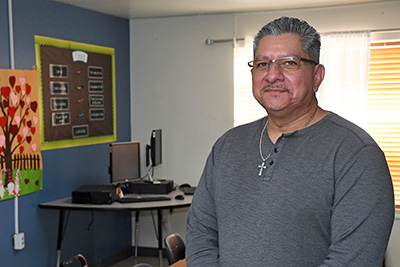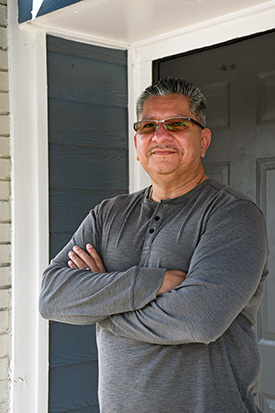Road to recovery: Alumnus gives hope amid drug epidemic

“Can you give me one day clean?”
Jesse DeLeon, Association for the Advancement of Mexican Americans treatment program manager, sits across from an 18-year-old addicted to crack. He instructs the young man, head down, slumped in his chair, to sit up.
“If you can give me one day, you can give me three,” DeLeon says. “If three, then seven. Separate yourself from high-risk situations. One week from today, we’re going to sit down, and I’ll ask you the same question.”
Working with teens and adults struggling with addiction, DeLeon has learned to let them hit rock bottom. Only if they’re willing to change can he help.
Rising above dysfunction

“Growing up in that era was crazy,” he said. “Everyone was getting high. In school, people wore marijuana leaves on necklaces.”
At 13, tired of his dad stumbling in drunk and beating up his mom, DeLeon ran to an aunt’s house, where he lived throughout early high school. Only years later did he realize he’d grown up in a dysfunctional home.
Later working in IT in Dallas, DeLeon returned to school after the industry bottomed out. He pursued bachelor’s and master’s degrees and a new career path: teaching developmental college classes. Once again, he came face-to-face with drug addiction, this time among his students.
In 2008, DeLeon moved back to Houston to help care for his dad after surgery. Just before his dad passed away, he told him he forgave him for everything he’d done to their family: “But I’m doing this for myself so I can move forward.”
“His whole life, he didn’t feel he did anything wrong,” DeLeon said. “That’s what addiction does to you. You live in denial and don’t realize what you’re doing to others.”
Becoming a drug counselor
Tired of the drug epidemic, DeLeon finally decided to become part of the solution.
At this point, San Jacinto College entered the picture. Cayman Tirado, currently San Jac’s mental health services program director, met with him to plan his academic path. In a year, he finished five drug and alcohol abuse counseling classes and became a licensed chemical dependency counselor.
“From the start, Jesse stood out as ambitious and dedicated to helping individuals with substance use disorders,” Tirado said. “He has unwavering compassion.”
In 2019, DeLeon went on to complete his associate degree in mental health counseling to become a full-time drug counselor. Today, he helps teens in juvenile probation and adults with DWIs and small drug possession charges in outpatient/reintegration court cases.
To commit to lasting change, each person must see the addiction lifestyle isn’t bringing success.
“When you show them dollar for dollar how much they’ve spent on drugs and alcohol for the last 10 years while living in a $20,000 house, it’s getting them to make that decision themselves,” he said. “You can’t force change on anyone.”
Promoting change
In substance abuse counseling, DeLeon’s reward is not earning a fat paycheck but seeing someone get sober and move forward.
Up to 30% of clients, like DeLeon’s dad, deny the problem. The other 70% accept how drugs disrupt their lives and begin to think and carry themselves differently.
When former clients message him that they’ve bought houses, married, or reunited with kids, DeLeon always responds the same: “It wasn’t me. You did the work.”
Even so, he is playing a part, showing the path from dead-end addiction to hope.
“What’s the ultimate goal of a person’s being?” he said. “It’s leaving this world better than when you got here.”
Be a Part of the Solution
Want to make a difference in the drug abuse prevention and counseling field too?
Learn more about mental health degrees and certificates
What’s the ultimate goal of a person’s being? It’s leaving this world better than when you got here.
